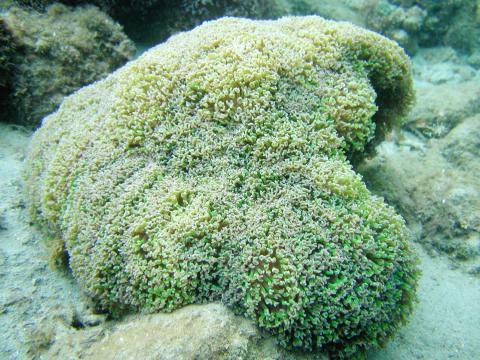Taiwanese and US marine biologists have solved a major scientific puzzle on the bioluminescent color changes seen during the life cycles of coral, and the findings might be used to find ways to protect human skin from damage by ultraviolet rays.
In a research collaboration between the National Museum of Marine Biology and Aquarium (NMMBA) and the Scripps Institute of Oceanography in San Diego, California, scientists found that coral fluorescence changes from green in larvae to cyan in adult colonies.
According to Fan Tung-yun (樊同雲), co-author of the research report, ultraviolet radiation is harmful to coral and leads to coral bleaching and can even kill reef colonies.

Photo courtesy of the National Museum of Marine Biology and Aquarium
Past studies determined that coral have fluorescent proteins in their cells, which absorb higher-energy light and emit fluorescent light in a lower energy field, but the changes in life development and its associated behavior had not yet been fully explained, Fan said.
For the collaboration, the museum harvested newborn stony coral larvae (Seriatopora hystrix) in waters off Kenting’s South Bay (南灣) and raised them in an aquarium.
The paper — titled Life History Changes in Coral Fluorescence and the Effects of Light Intensity on Larval Physiology and Settlement in Seriatopora hystrix — was co-authored by Fan and US counterparts, M.S. Roth and Dimitri Deheyn.
The scientists subjected newborn larvae, growing larvae and adult polyps to varying wavelengths of light radiation, including ultraviolet, blue and cyan-colored lights.
Results indicated that the change in fluorescence from green in larvae to cyan in adult colonies can be attributed to physiological traits, and the fluorescent protein is affected by environmental conditions, heat stress, as well as differences in light levels and wavelengths.
“The fluorescent proteins have a varying protective effect during the coral’s life cycle. It is likely correlated with the fact that planktonic larvae float near the ocean’s surface [and are more exposed to sunlight] while adult polyps are anchored on the seafloor at some depth [and are thus more protected],” Fan said.
“Our discovery might benefit research into the protection of human skin from ultraviolet radiation. Scientists may be able to develop new types of sun screens or protective suits to guard against solar radiation and offer people greater protection,” he added.

Chinese Nationalist Party (KMT) Chairman Eric Chu (朱立倫), spokeswoman Yang Chih-yu (楊智伃) and Legislator Hsieh Lung-chieh (謝龍介) would be summoned by police for questioning for leading an illegal assembly on Thursday evening last week, Minister of the Interior Liu Shyh-fang (劉世芳) said today. The three KMT officials led an assembly outside the Taipei City Prosecutors’ Office, a restricted area where public assembly is not allowed, protesting the questioning of several KMT staff and searches of KMT headquarters and offices in a recall petition forgery case. Chu, Yang and Hsieh are all suspected of contravening the Assembly and Parade Act (集會遊行法) by holding

PRAISE: Japanese visitor Takashi Kubota said the Taiwanese temple architecture images showcased in the AI Art Gallery were the most impressive displays he saw Taiwan does not have an official pavilion at the World Expo in Osaka, Japan, because of its diplomatic predicament, but the government-backed Tech World pavilion is drawing interest with its unique recreations of works by Taiwanese artists. The pavilion features an artificial intelligence (AI)-based art gallery showcasing works of famous Taiwanese artists from the Japanese colonial period using innovative technologies. Among its main simulated displays are Eastern gouache paintings by Chen Chin (陳進), Lin Yu-shan (林玉山) and Kuo Hsueh-hu (郭雪湖), who were the three young Taiwanese painters selected for the East Asian Painting exhibition in 1927. Gouache is a water-based

Taiwan would welcome the return of Honduras as a diplomatic ally if its next president decides to make such a move, Minister of Foreign Affairs Lin Chia-lung (林佳龍) said yesterday. “Of course, we would welcome Honduras if they want to restore diplomatic ties with Taiwan after their elections,” Lin said at a meeting of the legislature’s Foreign Affairs and National Defense Committee, when asked to comment on statements made by two of the three Honduran presidential candidates during the presidential campaign in the Central American country. Taiwan is paying close attention to the region as a whole in the wake of a

OFF-TARGET: More than 30,000 participants were expected to take part in the Games next month, but only 6,550 foreign and 19,400 Taiwanese athletes have registered Taipei city councilors yesterday blasted the organizers of next month’s World Masters Games over sudden timetable and venue changes, which they said have caused thousands of participants to back out of the international sporting event, among other organizational issues. They also cited visa delays and political interference by China as reasons many foreign athletes are requesting refunds for the event, to be held from May 17 to 30. Jointly organized by the Taipei and New Taipei City governments, the games have been rocked by numerous controversies since preparations began in 2020. Taipei City Councilor Lin Yen-feng (林延鳳) said yesterday that new measures by